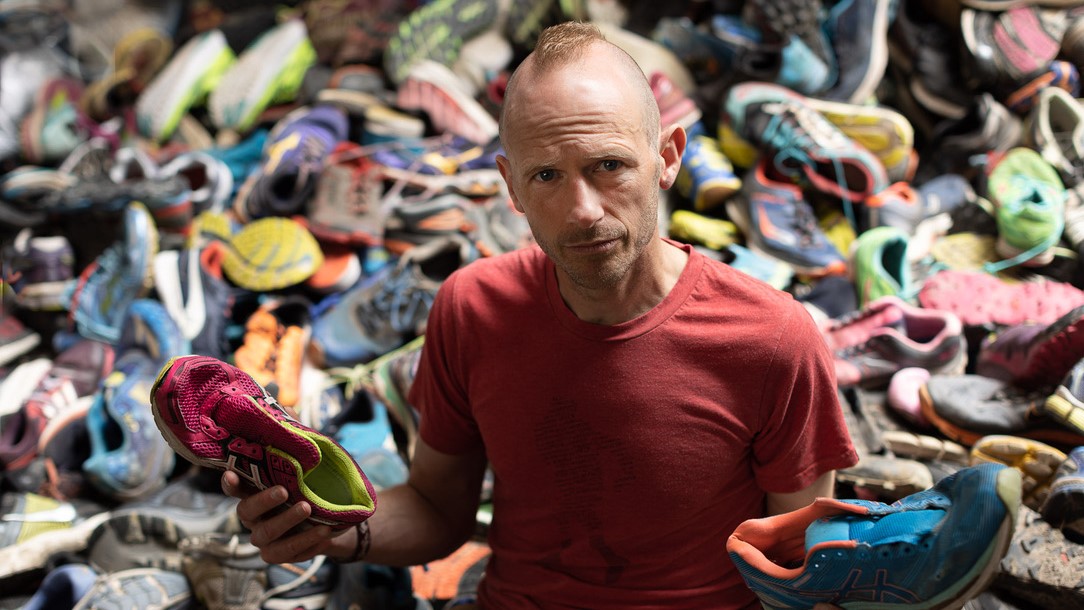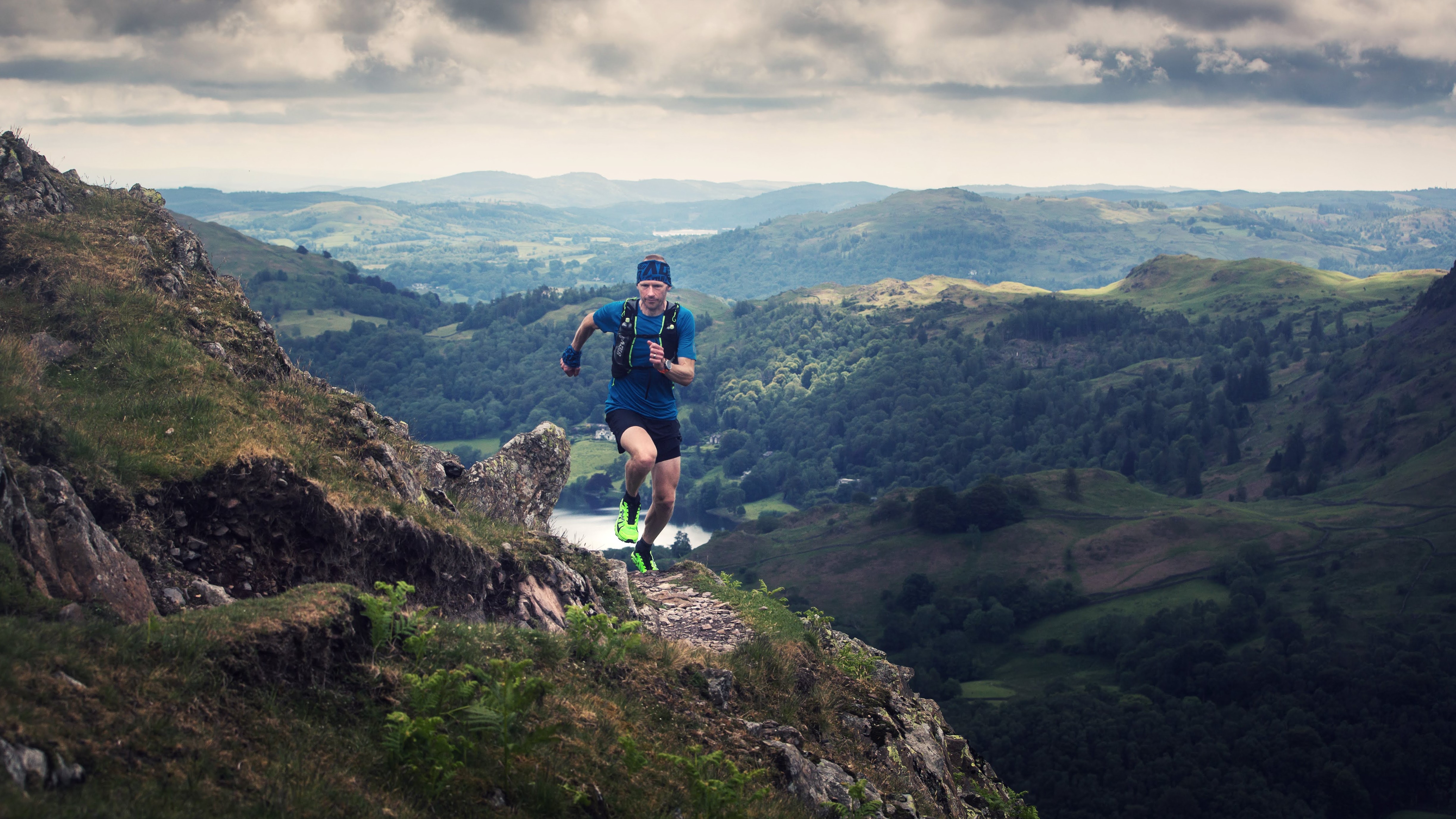What runners like you can do to help fight climate change
Ultrarunner, environmentalist and author Damian Hall offers some timely advice on how runners can reduce their carbon footprint

British ultrarunner Damian Hall has set FKTs (fastest known times) on long-distance paths including the South West Coast Path, the Pennine Way and the Cape Wrath Trail. He is sponsored by inov-8, has competed for Britain in Trail Running World Championships and placed in the top five in the illustrious Ultra Trail Mont Blanc – but he is also an environmental activist and vocal advocate for urgent action to combat rising global temperatures.
Damian, a journalist before becoming a pro athlete and running coach, made a personal commitment to reduce his carbon footprint several years ago, by drastically reducing his travel, embracing a vegan diet and cutting down on his consumption of gear. And now – in a week that saw temperatures reach record levels across the UK and wild fires rage across Britain and Europe – he has released a new book: We Can't Run Away From This.
With a foreword by trail-running superstar Kilian Jornet (who launched his own foundation in 2020 to monitor the health of mountain environments), the book details the practical ways in which runners can reduce their carbon footprint, while continuing to enjoy their activity of choice.
Here, Damian shares with Advnture his top tips on how to be an environmentally friendly, fleet-footed soldier in the fight against human-caused climate change.

Travel
For most runners and outdoor folk, the largest slice of their individual carbon footprint will be caused by travel, at around 25% – and this activity accounts for one fifth of global emissions. We're not yet at the point where we should consider completely giving up doing the things we love, but perhaps we can do them with less harm caused? Flying is the most carbon-intensive thing we can do. A flight from London to Berlin creates three times the CO2e (carbon emissions) saved from a year of recycling, and only the US and China generate more emissions via boarding passes than us here in the UK. In most cases a train journey will create around a quarter to a third of CO2e of a flight.
Fossil fuel–powered cars aren't great either; the bigger they are and the fewer passengers they transport on a trip the worse the situation is (if SUVs were a nation, they would rank seventh in the world for emissions). However four in a car is equivalent CO2e to a train journey. A bike ride is carbon neutral. Unless your pedal power is fuelled by beef, in which case your cycling journeys are about as bad as a car. If you want to know more about this last fact, read Mike Berners-Lee's essential How Bad Are Bananas?)
Food
Talking of nosh, we already know red meat is linked to most of the worst diseases and clearly isn't very kind to animals. It's also terrible for the planet. Meat and dairy alone are responsible for 18% of global CO2e, which is right up there with travel. Beef is by far the worst, costing the planet 60kg CO2e just to produce 1kg of meat, which is crazily inefficient. This graph turned me vegan. Yes, there's far too much plastic packaging in the world, but it’s the food in the packaging that’s the most important thing – with almost all meat and dairy being worse for the planet than plants.
All the latest inspiration, tips and guides to help you plan your next Advnture!
Sadly, 'sustainably' reared beef is no better and eating local isn't necessarily better environmentally (90% of international food is shipped, which is really efficient). Food waste is an epic, er, waste too, and far more significant than where the food came from and what it's wrapped in. A quarter of our footprint comes from food and it can be reduced by over 70% by cutting out animal flesh and juices.
Kit and stuff
The running shoe industry is responsible for approximately the same annual emissions as the entire United Kingdom. Shoes are almost all made from plastic (which derives from fossil fuels) and almost all are non-recyclable. The clothing industry as a whole is responsible for many times more pollution again, possibly as much as 10% of global CO2e (although that's disputed). And then there's the large range of environmental and ethical issues around the manufacturing process: massive water usage and pollution, toxic dyes and chemicals, slave labor, child labor, the fact 69% of our clothes are made from fossil fuels – the very thing scientist warn us we need to stop using right away – and the millions of microfibers released into the oceans, harming wildlife and probably us too.
With clothing (but not footwear), plenty of CO2e is emitted by us, the consumer, every time we wash and dry items (with more microfibers released). The industry excels at greenwash, bandying phrases like 'eco friendly' about willy-nilly, but pumping out an endless stream of products in the overconsumption crisis which is rapidly making the planet unliveable. So, should we wear T-shirts made from bamboo and daps made from mushrooms? Well, those materials all still cause CO2e in production (and they may not be as durable). The most sustainable kit is the stuff we're already wearing. We need to buy less and make it last longer.

Be a little bit activist
We shouldn't feel guilty for existing. Almost none of this stuff is our fault. It was BP who invented the idea of a personal carbon footprint, the idea individuals are to blame for the climate and ecological emergency, not huge multi-billion-pound corporations plundering the planet. Sure, grab the low-hanging fruit (try to avoid flying, eating meat, or buying new kit unnecessarily), but after that we need to push for systemic change. Join in with protests, civil disobedience, online campaigns; email your MP, your favorite brands and companies; talk to anyone who'll listen. That will have more impact. This stuff has gone beyond urgent.
We Can't Run Away From This is available on pre-release now, and for every copy sold Vertebrate Publishing will pay £1 to UK tree planting and rewilding projects.
- Pat KinsellaAdvnture Consulting Editor

